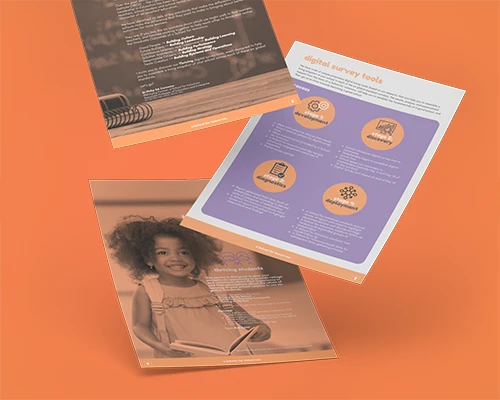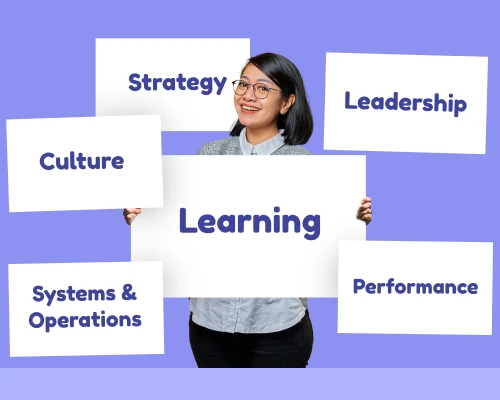
Dr Phil Cummins
May 26, 2024 | 3 minute read
The Character of Creativity
Written by Dr Phil Cummins
Promotion
a School for tomorrow's
Game Changers: Leading Today’s Learning for Tomorrow’s World
The world is changing – and rapidly. If we want to foster young people’s ability to learn, live, lead and work in that changing world, the way we approach education and leadership in schools must change too.
Buy NowWhat do you do to create? Where do you create? Why do you create?
Creativity is inherent in every individual, whether that’s the creativity required to improve and refine the status quo, or the creativity that sits behind innovation – the generation of something new and fresh, something genuinely original. Creativity of either type – improvement or innovation – is central to the work of the game changer. When we imagine what it means to be a bold pioneer, someone who doesn’t ask permission but seeks to take us all on a journey of exploration, discovery and encounter, we are talking about someone who conceives of a different preferred future and a pathway towards it that means taking a big step forward and up.
Creativity starts with your preparation to be and become a difference for people and place and planet. You have to step out of the everyday, to pause, and to clear your heart and mind so that you can listen to your inner voice. In time, as you move gently from stillness to wander and wonder in a new space, you will begin to be equipped to see what matters, to discern right from wrong, and to appreciate a beauty that both pleases and provokes. You will observe patterns of similarity and divergence, exercise curiosity about cause and effect, and draw connections between the attraction of form and the practicality of function.
Creativity continues as you set off on an adventure in finding your purpose. You have to make a decision to take a big step forward and up that brings about a meaningful change in how you bring your voice to life through your agency. As your journey of broad and deep, slow and quick, serious and fun experiences unfolds, you will be empowered to reflect on your growth, affirm your progress, and confirm the direction ahead. You will use openness and intrigue to explore your options, encounter your potential through enterprise and initiative, and discover power and strength in your resilience.
Creativity emerges as your practice of the imagination that sees through to what must change in the future and the innovation that sees how to make this happen. You will need to craft a set of routines that enable you to acquire expertise in the knowledge, skills, dispositions and habits to perpetuate the legacy of received and learned values and to generate new value through a voice and agency that advocates for the other. This will give you the confidence to create successfully by collaborating meaningfully and enjoyably, generating energy resourcefully and enthusiastically, and designing artfully and empathetically.
There are ten things I’ve learned about the process of creativity that I use in my own work as a writer and leader and educational designer:
- Do your homework: I need to learn everything I can about the field in which I seek to create so that I am approaching it with a clear knowledge and understanding about what has come before and be well placed to think about what might come next.
- “Leave me alone”: I need freedom from distraction and interruption so that I can prepare myself, focus on my own thoughts, and generate ideas that could prove to be of interest and relevance.
- Wander and wonder: I need to feel as though I can explore possibilities and ask questions about what might come next and what might be different without any negative reaction or threat of adverse consequence.
- Trust the process: I need to follow my instinct about my own fresh ideas down rabbit-holes and not worry about their feasibility until the process tells me it is time to test their validity and workability.
- Iterate or improve: I need to feel very comfortable not coming up with an idea from scratch but rather taking somebody else's idea and adapting it to a new context or purpose, or maintaining its current application but improving its impact relative to the outcomes I want to achieve.
- Evolve and capture: I need to be allowed initially to work to a loose timeline and with minimal requirements for paperwork, drawing up solutions in detail only when I know that they work and are ready to be shared.
- Come back later: I need to be able to leave an idea or thought half-formed and pick it up again later when time and resources allow me to bring it to fruition.
- Test, tinker, trash: I should be encouraged to develop and test in the field prototypes, models and hypotheses, recording my findings and observations as I go, before implementing in scale only those things that work.
- Tell the story: I need to be allowed to find my own voice, agency and advocacy in the project at hand and should be expected to create a narrative of the journey of exploration, encounter and discovery which I pass on to others.
- Complete – never finished: I need to feel permission to treat every solution as a necessarily complete work that’s also still a work in progress which will benefit from further iteration and experimentation to improve its effectiveness and suitability over time
I’ve also learned that I need to model for those around me both this process of creativity and the mindset and method of research in order to demonstrate an openness and willingness to learn continuously about both the journey and the destination ahead that we value at a School for tomorrow. and within our broader global network.
I love to create through my writing, my music and in my kitchen. I also love to create through my work – the generation, operation and review of ideas supported by evidence that can be and become a difference in the lives of others.
The Game Changers podcast is part of this work. Adriano Di Prato and I created this public education program in February 2020 to showcase how bold pioneers can really make a difference in education and for people, place and planet. We’re launching our sixteenth series tomorrow. We invite you to join us as we explore The Character of Creativity.
I’m excited!
I can’t wait!
Let’s go!
Related Content
.png)
Article
Student Agency & Culture
Products & Services
Discover our 'Thriving' Digital Survey ToolsLike what you’ve read?
Let’s keep the conversation going.
